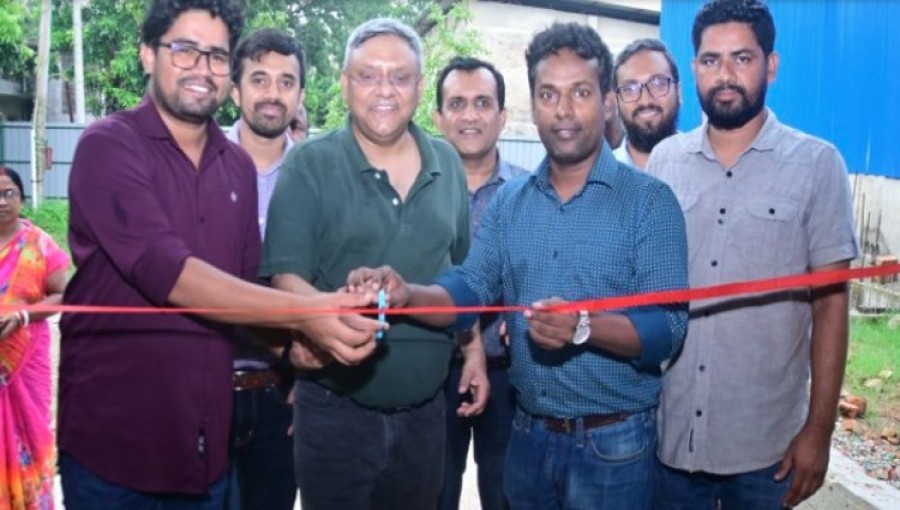
Photo: Collected
Dignitaries and officials at the inauguration of the Feni Recycling Business Unit (RBU) by Bangladesh Petrochemical Company Limited (BPCL) in Daganbhuiyan, Feni. Photo: Collected
In a significant step towards combating marine plastic pollution, Bangladesh Petrochemical Company Limited (BPCL) has inaugurated a new Recycling Business Unit (RBU) in Feni. This new facility, opened as part of the broader Plastic Free Rivers and Seas for South Asia (PLEASE) project, underscores BPCL's commitment to establishing a sustainable circular economy and promoting environmentally responsible waste management practices.
Feni June 10,(V7N)- On Sunday, (June 9)Bangladesh Petrochemical Company Limited (BPCL) officially inaugurated the Feni Recycling Business Unit (RBU), marking a significant milestone in the fight against marine plastic pollution.
The event, held in Daganbhuiyan, Feni, is part of the project “Formalization of the Plastic Recycling Value Chain by Forming Recycling Business Units in Bangladesh,” a component of the broader Plastic Free Rivers and Seas for South Asia (PLEASE) project.
The inauguration ceremony was attended by Obaidul Islam, Project Manager of the United Nations Office for Project Services (UNOPS), Khadem Mahmud Yusuf, CEO and Managing Director of BPCL, and Abu Saleh Nur Mohammad, Assistant General Manager of the Center for Development Innovation and Practices (CDIP).
The PLEASE project is being implemented by BPCL in cooperation with the South Asia Cooperative Environment Program (SACEP), UNOPS, and the World Bank. This initiative aims to establish a sustainable circular economy in the Feni region by transporting, storing, and processing recyclable plastic waste. By reducing the amount of plastic waste entering our seas, the project promotes sustainable waste management practices that protect marine ecosystems and community health.
"The inauguration of Feni RBU today is a testament to our commitment to a sustainable future. By tackling plastic pollution, we are not only protecting our environment but also creating job opportunities and improving social conditions for many, especially women," said Khadem Mahmud Yusuf, CEO and Managing Director of BPCL.
The primary goal of the project “Formalization of Plastic Recycling Value Chain by Forming Recycling Business Units in Bangladesh” is to establish seven Recycling Business Units (RBUs) across Bangladesh, where plastic waste will be transported, stored, and processed for recycling.
The project aims to reduce plastic waste flowing into our seas and ensure sustainable waste management to protect marine ecosystems and community health.
Currently, only 30% of plastic waste in Bangladesh is recycled. The Feni Recycling Hub is a crucial step toward addressing this issue and supporting sustainable development goals. Feni Municipality produces 70-80 tons of waste daily, which is often challenging to manage due to unplanned urbanization. The Feni RBU aims to process 3 tons of waste daily, significantly reducing plastic pollution and engaging local women workers to improve their social conditions.
With the cooperation of the Center for Development Innovation and Practices (CDIP), BPCL will organize capacity-building training and health camps at the Feni RBU. Day-care facilities and easy access to water sanitation will be provided for female waste workers, ensuring a suitable working environment.
The Feni RBU is equipped with two baling machines and a PET bottle cold washing system with a capacity of 500 kg per hour, ensuring efficient plastic processing. The PLEASE project strives for a cleaner environment and creates job opportunities for locals.
By establishing RBUs, the project contributes to Bangladesh’s national goal of achieving a 50% plastic recycling rate by 2025. This aligns with the World Bank's vision of a $172 billion climate-smart investment opportunity in Bangladesh by 2030. The Feni RBU will create employment for 25-30 people and involve 50 waste pickers in the process. Emphasis will be placed on empowering and training women in the workplace. The Feni RBU stands as a testament to Bangladesh’s commitment to a sustainable future.
About BPCL:
Bangladesh Petrochemical Company Limited (BPCL) is the country’s first post-consumer PET bottle recycling plant, setting an example of "waste to value" creation. Since 2012, BPCL has converted used PET bottles into 10,500 metric tons of recycled PET resin annually, representing a successful “Recover and Recycle” model.
END/V&N/SMA/DK/

Comment: